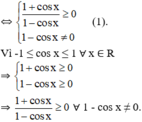Hãy nhập câu hỏi của bạn vào đây, nếu là tài khoản VIP, bạn sẽ được ưu tiên trả lời.

1.
Hàm số xác định khi: \(1-2sinx\ne0\Leftrightarrow sinx\ne\dfrac{1}{2}\Leftrightarrow\left[{}\begin{matrix}x\ne\dfrac{\pi}{6}+k2\pi\\x\ne\dfrac{5\pi}{6}+k2\pi\end{matrix}\right.\)

Đáp án D
Hàm số có tập xác định R khi m cosx + 1 > 0, ∀x (*) .
Khi m = 0 thì (*) luôn đúng nên nhận giá trị m = 0.
Khi m > 0 thì mcosx + 1 ∈ [-m + 1; m + 1] nên (*) đúng khi -m + 1 > 0 => 0 < m < 1.
Khi m < 0 thì mcosx + 1 ∈ [m + 1; -m + 1] nên (*) đúng khi m + 1 > 0 => -1 < m < 0
Vậy giá trị m thoả mãn là -1 < m < 1.

a.
\(\Leftrightarrow m-cosx\ge0\) ; \(\forall x\)
\(\Leftrightarrow m\ge max\left(cosx\right)\)
\(\Leftrightarrow m\ge1\)
b.
\(\Leftrightarrow2sinx-m\ge0\) ; \(\forall x\)
\(\Leftrightarrow m\le2sinx\) ; \(\forall x\)
\(\Leftrightarrow m\le\min\limits_{x\in R}\left(2sinx\right)\)
\(\Leftrightarrow m\le-2\)
c.
\(\Leftrightarrow cosx+m\ne0\) ; \(\forall x\)
\(\Leftrightarrow\left[{}\begin{matrix}m>\max\limits_R\left(cosx\right)\\m< \min\limits_R\left(cosx\right)\end{matrix}\right.\)
\(\Leftrightarrow\left[{}\begin{matrix}m>1\\m< -1\end{matrix}\right.\)

Hàm số xác định trên R khi và chỉ khi:
\(sin^2x+\left(2m-3\right)cosx+3m-2>0;\forall x\in R\)
\(\Leftrightarrow-cos^2x+\left(2m-3\right)cosx+3m-1>0\)
\(\Leftrightarrow t^2-\left(2m-3\right)t-3m+1< 0;\forall t\in\left[-1;1\right]\)
\(\Leftrightarrow t^2+3t+1< m\left(2t+3\right)\)
\(\Leftrightarrow\dfrac{t^2+3t+1}{2t+3}< m\) (do \(2t+3>0;\forall t\in\left[-1;1\right]\))
\(\Leftrightarrow m>\max\limits_{\left[-1;1\right]}\dfrac{t^2+3t+1}{2t+3}\)
Ta có: \(\dfrac{t^2+3t+1}{2t+3}=\dfrac{t^2+t-2+2t+3}{2t+3}=\dfrac{\left(t-1\right)\left(t+2\right)}{2t+3}+1\)
Do \(-1\le t\le1\Rightarrow\dfrac{\left(t-1\right)\left(t+2\right)}{2t+3}\le0\)
\(\Rightarrow\max\limits_{\left[-1;1\right]}\dfrac{t^2+3t+1}{2t+3}=1\)
\(\Rightarrow m>1\)

ĐKXĐ:
a. Không hiểu đề bài là gì
b. \(3-2cosx\ge0\)
\(\Leftrightarrow cosx\le\dfrac{3}{2}\) (luôn đúng)
Vậy \(D=R\)
c. \(\left\{{}\begin{matrix}\dfrac{1+cosx}{1-cosx}\ge0\left(luôn-đúng\right)\\1-cosx\ne0\end{matrix}\right.\)
\(\Leftrightarrow cosx\ne1\Leftrightarrow x\ne k2\pi\)

Đặt \(t=cosx;t\in\left[-1;1\right]\)
Để hàm số có tập xác định R
\(\Leftrightarrow cosx^2-\left(2+m\right)cosx+2m\ge0;\forall x\)
\(\Leftrightarrow t^2-\left(2+m\right)t+2m\ge0\) với mọi \(t\in\left[-1;1\right]\)
Đặt \(f\left(t\right)=t^2-\left(2+m\right)t+2m\); \(I\left(\dfrac{2+m}{2};f\left(\dfrac{2+m}{2}\right)\right)\)
TH1: \(\dfrac{2+m}{2}< -1\) \(\Leftrightarrow m< -4\)
Để \(f\left(t\right)\ge0;\forall t\in\left[-1;1\right]\) \(\Leftrightarrow\)\(f\left(t\right)_{min}=f\left(-1\right)\ge0\) \(\Leftrightarrow3+3m\ge0\Leftrightarrow m\ge-1\)(ktm đk)
TH2: \(-1\le\dfrac{m+2}{2}\le1\)\(\Leftrightarrow-4\le m\le0\)
Để \(f\left(t\right)\ge0;\forall t\in\left[-1;1\right]\) \(\Leftrightarrow f\left(t\right)_{min}=f\left(\dfrac{2+m}{2}\right)\ge0\)\(\Leftrightarrow-m^2+4m-4\ge0\)\(\Leftrightarrow m=2\) (ktm đk)
TH3:\(\dfrac{m+2}{2}>1\) \(\Leftrightarrow m>0\)
Để \(f\left(t\right)\ge0;\forall t\in\left[-1;1\right]\)\(\Leftrightarrow f\left(t\right)_{min}=f\left(1\right)\ge0\)\(\Leftrightarrow m-1\ge0\Leftrightarrow m\ge1\)
Kết hợp cả ba TH \(\Rightarrow m\ge1\)
Vậy...
Đơn giản hơn:
\(t^2-\left(m+2\right)t+2m\ge0\) ; \(\forall t\in\left[-1;1\right]\)
\(\Leftrightarrow t\left(t-2\right)-m\left(t-2\right)\ge0\)
\(\Leftrightarrow\left(t-m\right)\left(t-2\right)\ge0\) (1)
Do \(t-2< 0\) ; \(\forall t\in\left[-1;1\right]\) nên (1) tương đương:
\(t-m\le0\)
\(\Leftrightarrow m\ge t\) ; \(\forall t\in\left[-1;1\right]\)
\(\Rightarrow m\ge1\)

Hàm số  xác định
xác định

Do đó (1) ⇔ 1 – cos x ≠ 0 ⇔ cos x ≠ 1 ⇔ x ≠ k.2π.
Vậy tập xác định của hàm số là D = R \ {k.2π, k ∈ Z}.
ko hiểu chỗ y<=1/3+\(\sqrt{\frac{3m^2+1}{9}}\)
\(y=\frac{cosx+m.sinx+1}{cosx+2}\Leftrightarrow y.cosx+2y=cosx+m.sinx+1\)
\(\Leftrightarrow m.sinx+\left(1-y\right)cosx=2y-1\)
Áp dụng điều kiện có nghiệm của pt lượng giác bậc nhất (hoặc BĐT Bunhiacopxki):
\(m^2+\left(1-y\right)^2\ge\left(2y-1\right)^2\)
\(\Leftrightarrow3y^2-2y\le m^2\)
\(\Leftrightarrow3\left(y-\frac{1}{3}\right)^2-\frac{1}{3}\le m^2\Leftrightarrow\left(y-\frac{1}{3}\right)^2\le\frac{3m^2+1}{9}\)
\(\Rightarrow y\le\frac{1}{3}+\sqrt{\frac{3m^2+1}{9}}\Rightarrow\frac{1}{3}+\sqrt{\frac{3m^2+1}{9}}=1\)
\(\Rightarrow3m^2=3\Rightarrow m=\pm1\)